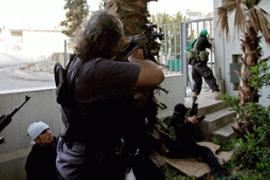Lebanon rivals reach deal in Doha
Country’s warring leaders set to announce deal to end 18 months of political turmoil.

Al Jazeera’s Beirut correspondent, Rula Amin, said from Doha that the agreement was a major breakthrough as the talks had appeared to be breaking down just hours earlier.
She said Sheikh Hamad bin Khalifa Al Thani, the Qatari emir, was still at the Sheraton hotel in the early hours of Wednesday, working with the rival Lebanese groups on the final wording of the declaration.
New president
Delegates are said to have reached a deal on electing Lebanon’s new president.
The two sides agreed on General Michel Suleiman, the head of the army, as a consensus candidate to succeed Emile Lahoud, the former president, who stood down at the end of his term in November.
Suleiman had appeared to be closer to the government coalition when he was first nominated but he was recently criticised as being too close to the opposition when his troops did not intervene when gun battles broke out between the warring sides this month.
The opposition got 11 out of 30 cabinet seats, our correspondent reported, meaning it can block any government decision it does not agree with.
And the two sides are also thought to have resolved a dispute over a parliamentary law for elections to be held next spring.
The changes to the electoral law gave Saad al-Hariri, the leader of the majority bloc in government, most of what he had asked for, our correspondent reported.
Hezbollah weapons
| Political deadlock |
 Background to Lebanon’s power vacuum Who’s who in Lebanese politics |
Samir Geagea, a prominent Christian leader in the majority bloc, said the dialogue had been dealt a “heavy blow” by the opposition.
Attempting a compromise, Akram Shehaieb, a Druze member of parliament, said the pro-government bloc wanted to address only the issue of the weapons used “against the Lebanese people in Beirut and the mountains” in recent clashes.